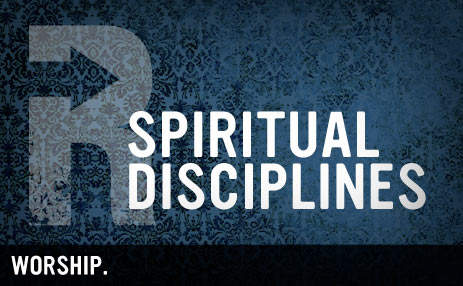Latest
-
Objections to the Christian Faith from the Unchurched and De-Churched
 Tue Dec 02, 2014
Tue Dec 02, 2014
by Resurgence -
Craig Groeschel: We Innovate for Jesus
 Tue Oct 14, 2014
Tue Oct 14, 2014
by Resurgence -
Mark Driscoll: Revelation
 Tue Oct 07, 2014
Tue Oct 07, 2014
by Resurgence -
RESURGENCE LEADERSHIP #034: JOHN PIPER, WHY I TRUST THE SCRIPTURES, PART 2
 Tue Sep 30, 2014
Tue Sep 30, 2014
by Resurgence -
Resurgence Leadership #033: John Piper, Why I Trust the Scriptures, Part 1
 Tue Sep 23, 2014
Tue Sep 23, 2014
by Resurgence

Archives
Spiritual Disciplines: Worship
Worship is continuously living our lives individually and corporately as living sacrifices to the glory of a person or thing. This connection between glory and worship is clear in places such as Romans 11:36–12:1 (NIV), which says, “To him be the glory forever! Amen. Therefore, I urge you, brothers, in view of God's mercy, to offer your bodies as living sacrifices, holy and pleasing to God—this is your spiritual act of worship.”  In this packed section of Scripture, Paul connects a number of vital truths regarding worship. First, we hold a person or thing in a place of glory. Second, we then worship that person or thing. Third, our worship of that person or thing we hold in glory is done by means of making sacrifices.
In this packed section of Scripture, Paul connects a number of vital truths regarding worship. First, we hold a person or thing in a place of glory. Second, we then worship that person or thing. Third, our worship of that person or thing we hold in glory is done by means of making sacrifices.
Glory
Glory means weightiness, importance, preeminence, and priority, or our greatest treasure, deepest longing, and fountain of hope. People can and do hold various people and things in a position of glory and then worship them by making sacrifices. Because we have limited resources (time, energy, money), we must allocate them to what we consider most important or glorious to us. Thus, we make sacrifices for our functional god. Whatever we hold in the position of highest glory is by definition our god. Practically, worship is making sacrifices for what we are living to glorify. Because we were made for the express purpose of worshiping God, every person is a worshiper. The only question is what or who we worship.
Sacrifice
The biblical word for worship is also sometimes translated “sacrifice.” This helpful insight indicates that we can uncover what we truly live to glorify by examining what exactly we are making the greatest sacrifices for. In short, we give our time, energy, body, money, focus, devotion, and passion to that which we glorify most, and we make sacrifices to worship that person or thing.
False Worship
The first two commandments (Exodus 20:1–6) state that there is only one God and that that God alone is to be worshiped. According to Martin Luther, we only break the rest of the commandments after we have broken the first two. What he means is that if I only have the One True God as my God and I only worship that God, then I will not end up committing idolatry by worshiping such things as my job and not taking a Sabbath, worshiping my anger and becoming violent, worshiping sex and committing adultery, worshiping things and stealing them, or worshiping success and becoming covetous of what other people have.
Worship or Idolatry?
The opposite of worship is idolatry (which is worshiping something or someone other than the One True God of the Bible, or worshiping God in a way that is contrary to His Word). On this point, Christian philosopher Peter Kreeft has said, “The opposite of Christianity is not atheism, but idolatry.” This theme of worship versus idolatry is in some ways the theme of the entire Old Testament. Romans articulates the pattern of false worship as failing to glorify God, which leads to an over-inflated and arrogant view of self that ends in worshiping created things rather than the Creator God alone.
Trinitarian Worship
The Trinity is our perfect model for worship as each member honors and glorifies the others ceaselessly and perfectly. That Trinitarian God made us in His image, which means that we were made for unceasing communion with Him in a life of continual worship to His glory. Our unceasing worship has been broken by sin, which separates us from God. As a result, Jesus entered into human history to take away our sin and reconnect us to God as we were created to be.
The Perfect Worshiper
Not only do we worship through Jesus, we must also worship like Jesus. Jesus is the person who has worshiped God the Father with the most glory of anyone who has ever lived. He is the perfect worshiper. Jesus lived a life of perfect glory to His Father and thus we can look at everything in His life, from the ordinary to the extraordinary, as born out of a life of ceaseless worship that glorified God the Father.
Unceasing Worship
Jesus’ life destroys any notion that worship is a sacred thing we do at a special time and special place. All of life is to be lived as ceaseless worship; cutting our grass and cleaning our dishes are as sacred and God-glorifying as raising our hands in church. Jesus Himself modeled this: He spent roughly 90 percent of His earthly life doing chores as a boy and working a carpentry job as a man. Paul sums up the life of unceasing worship best in 1 Corinthians 10:31, “So, whether you eat or drink, or whatever you do, do all to the glory of God.”